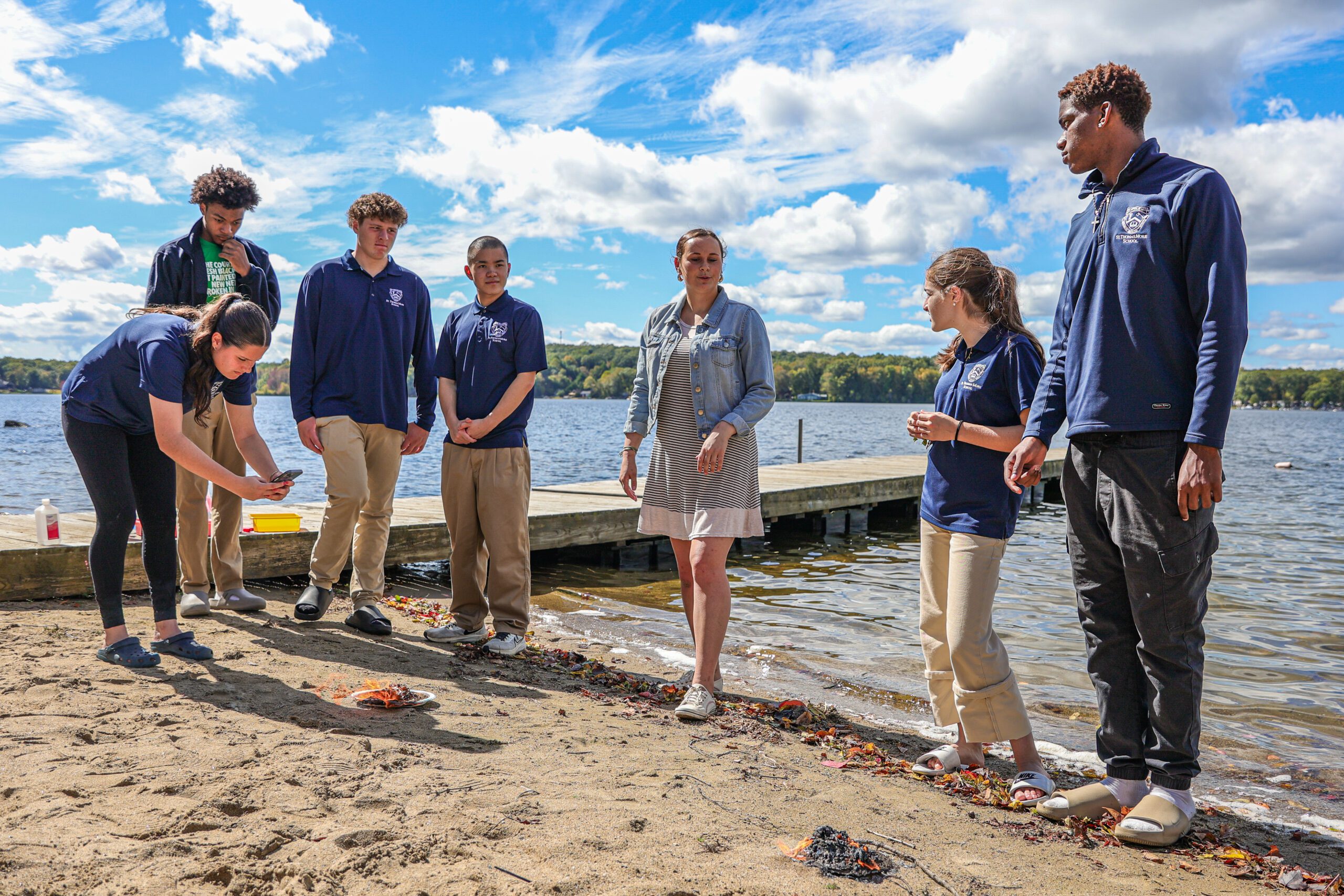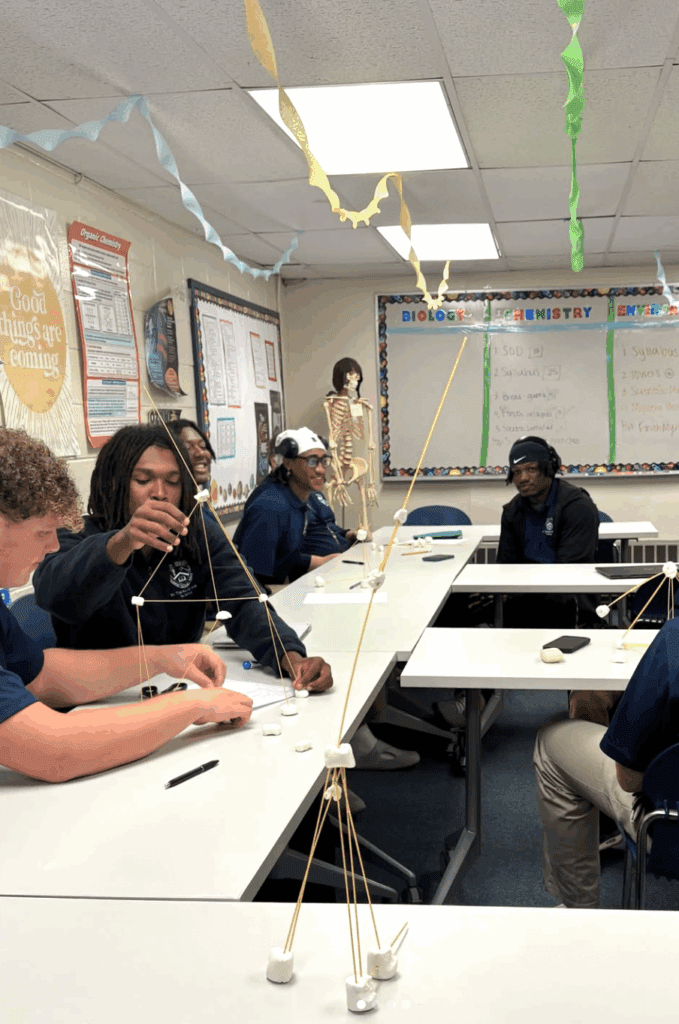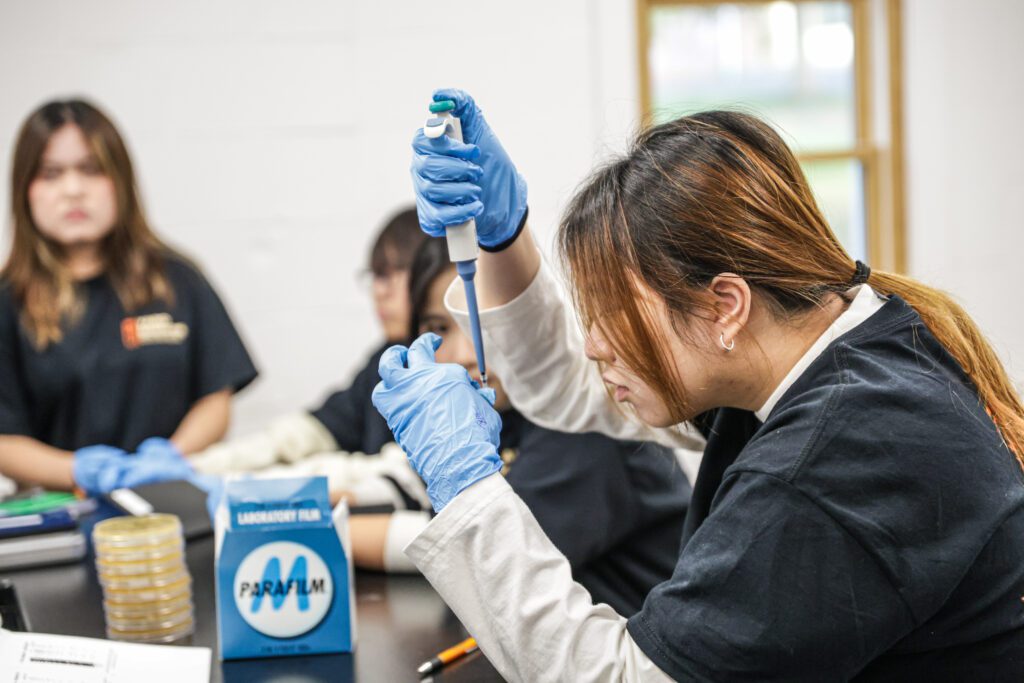SCIENCE
DEPARTMENT

Physical Science
The emphasis of the Physical Science course is on an introduction to Physics and Chemistry. Students learn about forces and energy in order to fully understand the underlying science behind other phenomenon in Chemistry. The class includes discussion of what engineering is and how civil, chemical, electrical, and mechanical engineers use science to contribute to society. Laboratory exercises and demonstrations are geared to generate hands-on experiences in Chemistry and Physics relevant to the daily lives of the contemporary student.
Chemistry
This course is designed to cover basic areas of chemistry, including equation writing and chemical calculations. Its intent is to prepare students for college level chemistry and give a background on chemicals found in the home and workplace. It covers the fundamental facts, laws, principles, theories, and concepts of chemistry necessary for further work in science or science related subjects, stressing atomic structure, quantum theory of atomic structure, chemical bonding, chemical reactions, mass and energy relationships in a chemical reaction, stoichiometry, gases, liquids, solids, and Solution Chemistry. As it is a laboratory course, lab techniques, report writing skills, mathematical calculations, analysis of data, and discussion or results are emphasized. Students will need a scientific calculator for the mathematics involved in this course.

Physics
Physics is a college preparatory course designed to ready students for future study on the college level. As an introductory course, it presents the basic principles and theories of Physics. Upon completion, students will have gained an understanding of major concepts of motion, acceleration, projectiles, forces, heat, light and sound. One goal of this course is to strike a balance between theory and practical application. Applied laboratory work and investigation, essential elements of this course, provide the opportunity to validate physical theories in a quantitative manner. Students will experience hands-on learning with proper calculations and learn ways to test the concepts of Physics. Laboratory experience will reveal the limitations of physical theories compared to real problems and introduce ways to minimize experimental uncertainly. All laboratory experiments will be open.
Earth Science
This course is designed to serve as a multifaceted introduction to the world of Science. This ninth grade course studies Earth and its environment by looking at locations and mapping; nature of science, geology; meteorology; astronomy, oceanology, natural resources and the environment. The course also emphasizes the scientific process, the application of scientific and inquiry skills, and the importance of communication and study skills. Students will learn to solve problems following the scientific method: to make observations, ask questions, form a hypothesis, test the hypothesis, record data, draw conclusions, and report results.
Health and Fitness
This course is designed to promote lifelong physical and mental well-being. The course is structured to emphasize physical fitness development, education on health, and helping students build a strong foundation for a balanced, healthy lifestyle. Studens will engage in a wide variety of individual and team-based workouts aimed at improving strength, endurance, flexibility, and overall physical conditioning. Activities include strength training with equipment, dynamic stretching routines and organized team sports such as basketball, soccer and tennis. Students will also practice teamwork and collaboration through group exercises and outdoor challenges that encourage communication, cooperation and mutual support. This course also focuses on the key elements of personal wellness. Weekly classroom sessions are designed to address important topics such as mental health, emotional regulation, stress management, sleep hygiene, nutrition and the influence of social media. Through open discussions, self-reflection activities and group projects, students will develop strategies for maintaining mental wellness and making informed, healthy choices

Biology
This is an introductory science course that is designed to acquaint students with the fundamental principles of Biology, the science of living organisms. This course's comprehensive content covers the diversity of life from a microscopic scale to the broad topic of our place among the stars. Students are encouraged to physically engage during laboratory exercises that utilize nature around our campus. Students use Gardner Lake for recognizing biological patterns, to catch and identify insects for entomology, to perform land surveys, and to plant their own vegetables and flowers in our indoor and outdoor green space. The scientific method strengthens students' ability to ask questions about biological patterns and inspires them to conduct individualized research. The learning process will include associating the course content with current scientific events. Each student will be encouraged to consider his own potential to pursue a professional career in the scientific world.
Environmental Science
This course is a hands-on, holistic approach to understanding our planet and the environment that surrounds us. Students will study the importance of the environment and how it pertains to everyday life on our planet. Upon completion, students will have gained an understanding of major concepts in sustainability, ecology, energy, health and our immediate environment, with the goal of striking a balance between speculation and practical application. Key components designed to help students to gain knowledge include hands-on examination, presentations and discussion through debates, designed to aid in resolving issues related to our planet. Hands-on examination is featured as students will have some class time outdoors in the deciduous forest and on Gardner Lake. In-class presentations will teach students public speaking and "teach to teach" peers in their classroom. Debate discussions are intended to strengthen team work, to learn compromise and to exercise critical thinking in producing solutions toward maintaining a homeostatic planet. This is a college preparatory course to ready each student for further education.
